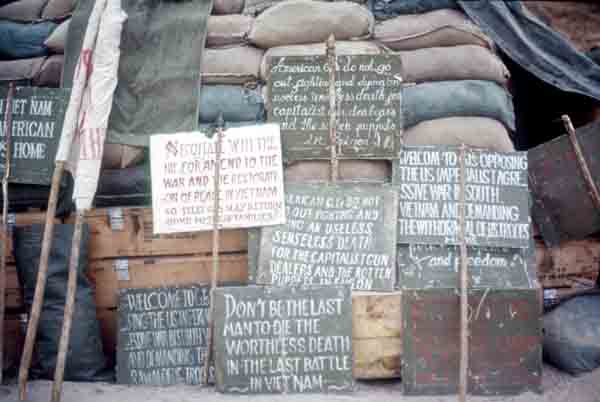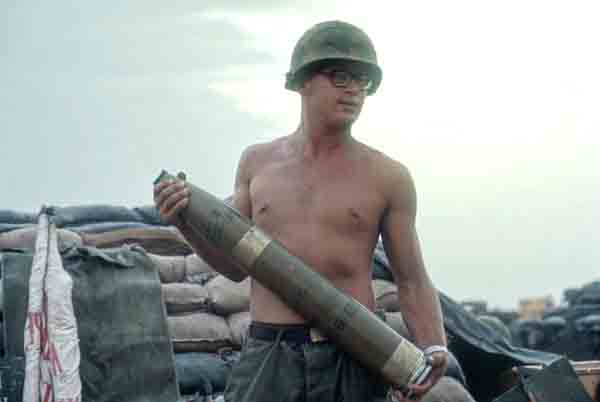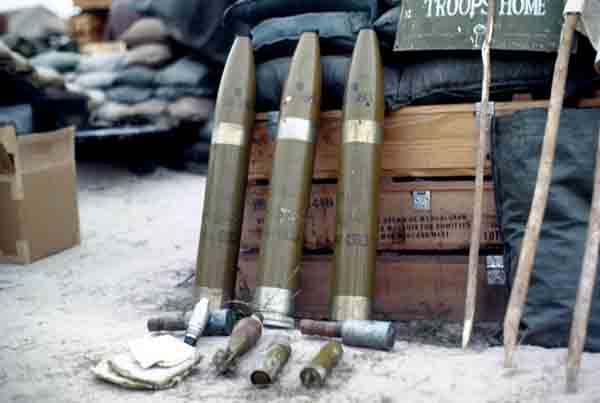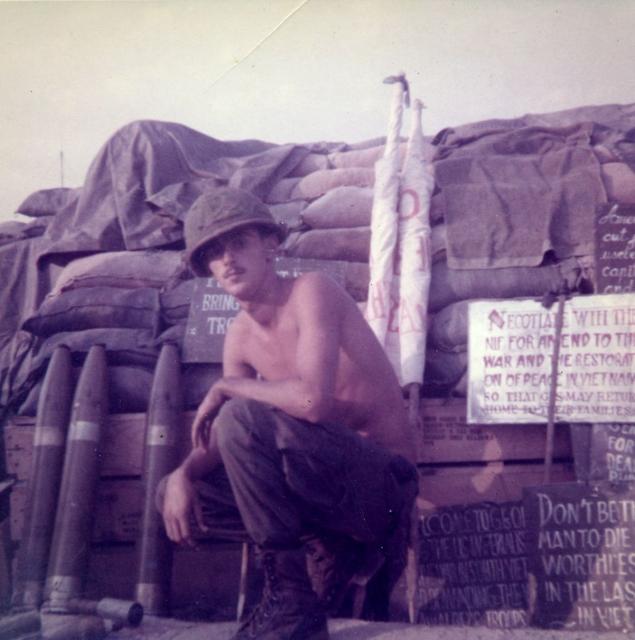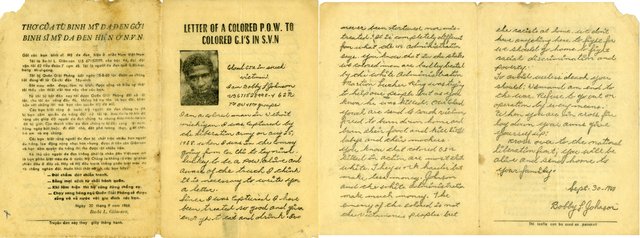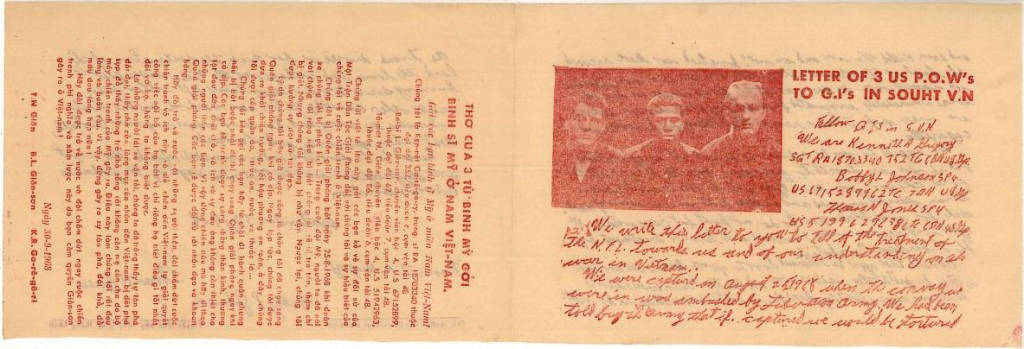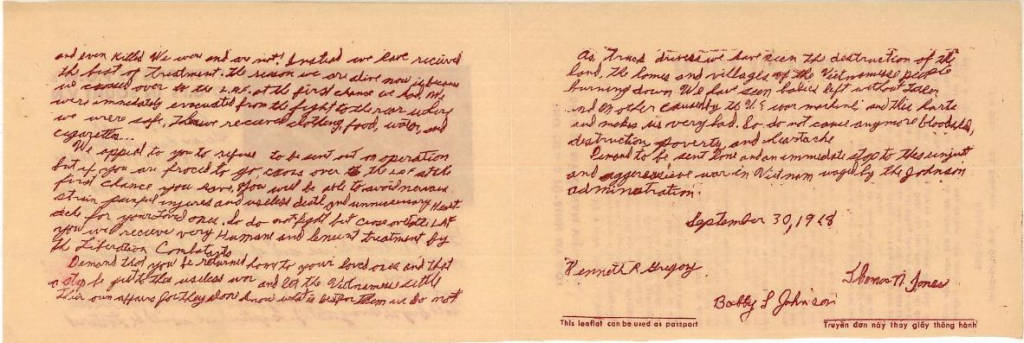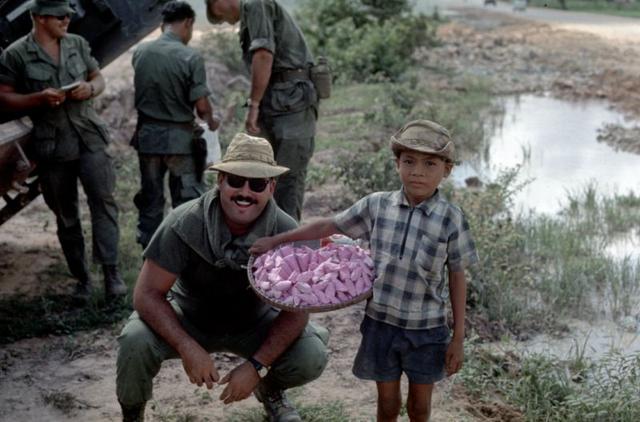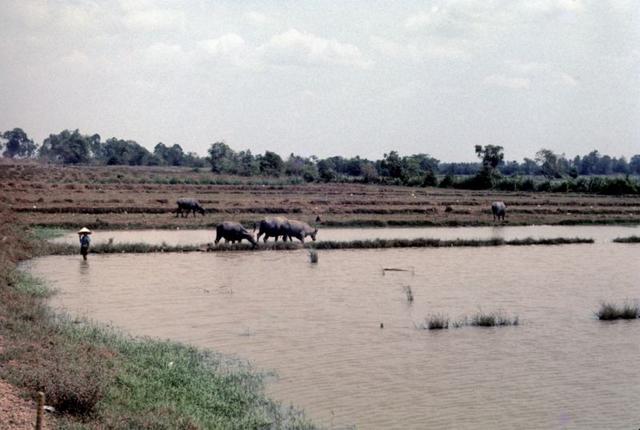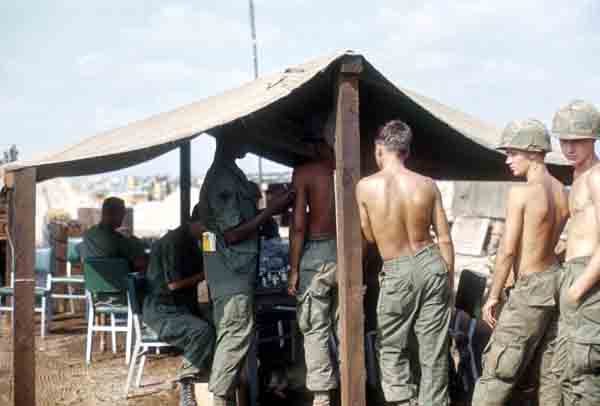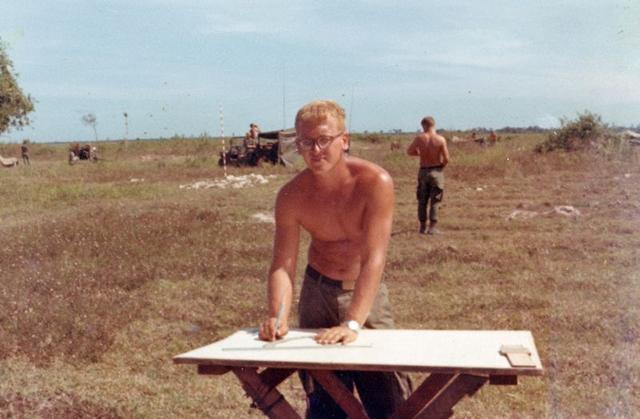- Propaganda signs My photo
- Propaganda banner. John Clark photo
FSB Washington was about a 250-foot diameter circle, manned by two Army units. The outer ring was built and occupied by an infantry company, while the rest of the place was designed and built to be filled with our six 105mm howitzers. The infantry job at the FSB was to protect the base from attack with help from us. During the day, three-fourths of the infantry went on hikes in the jungle, and the rest stayed and got well-deserved time off. As a consequence, the artillery part of the base was cleaner, more orderly and better maintained by us “cannon cockers” who were trapped there 24/7.
On a typical morning in the dry season, we would wake up to dust, heat and humidity, along with blue sky. Everyone would take an intense look around for signs of the enemy. Usually what we saw was the concertina wire that surrounded the border of the fire base like a belt, beginning six feet from the berm and extending out to about 30 feet in three rows, along with farmers beginning their day farther out. At first light one December morning, there were signs of enemy activity for sure, only this time they were literally signs. The enemy had stealthily managed to put signs and banners right at the edge of the concertina wire without the infantry being aware. Along with the signs were three 81mm rockets, two primitive hand grenades, two trip flares and some printed propaganda leaflets. Some of the signs were metal, and there was also a 24-foot banner staked in an arc. Seriously, who the fuck had been asleep on guard duty when all this crap was left?
By the time I was outside the bunker, everything had been taken down and brought inside the fire base, but we knew before leaving the bunker that something serious had happened, as we could hear the radio chatter while they tried to figure out how the hell it had gotten there. Inside the base, I could hear people hollering, asking not-so-gentle questions as they tried to figure out who had been napping. My immediate reaction was to reach for my M-16, chamber a round and head carefully outside. There was no telling where the enemy could be or what else they could do. As things calmed down a little, I stepped into the bunker, grabbed my SLR camera and emerged taking pictures. The signs were now standing up, nice and orderly as if they were posing for a family picture. I was not alone in this; many were also documenting the crazy start of this day. The printing looked to be done by a native English writer, but the messages were not expressed with words and sentences an American would use, so it seemed likely that POWS had been forced to write them. Regardless of who or how it had been created, the propaganda was a “come one, come all” to defect to the wondrous life of the enemy Vietnamese.
In the late 60’s, anyone paying attention knew about our country’s issues with civil rights and that certainly included the Vietnamese. They had information from the news, POWs, person–to- person interactions and working in the main bases, where flare-ups and grouping by race was not unusual. I was there in the third year of the big American war buildup, so there were hundreds of thousands of Americans and a myriad of conversations from which the enemy could pull ideas and information. They were certain some African Americans would be disenchanted with both the United States and the Vietnam War, so these soldiers were clearly targeted in some of the signs and banners.
- Me with enemy rocket My photo
- Rockets, propaganda leaflets My photo
- Signs and banner. John Clark Photo
In terms of small groups like our FSB and the infantry assigned to it, neither ploy would ever work, as any ethnic or other differences among us were far surpassed by helping each other survive. We shared our resources, and we got along, making the choice of locale for the propaganda even more absurd. The whole situation could be seen as a futile effort by the Vietnamese in terms of gaining defectors, but if was effective psychological warfare. They had managed to avoid detection during this installation of propaganda. The Vietnamese utilized “sappers,” who could sneak into a firebase with hand-carried explosives that used a contact fuse and throw them into the bunkers of the artillery gun crews where they would go off when they hit anything solid. We all knew how lucky we were that the “weapons” in this case had simply been propaganda.
The paper leaflets were a different approach. One leaflet was an appeal from McKinley Nolan who, as it turns out, is the last unaccounted for American from the war. His story is complex and contradictory, and most of the information included here is from researcher Richard Linnett and the documentary film, “The Disappearance of McKinley Nolan,” by Corra Productions. Some American painted the signs and the banner. I did not understand the internal Vietnamese politics, and no one I knew or asked could explain them to me. What could our enemy offer McKinley to solve the problems in his life or the racial conflict in America? McKinley may have surrendered or was captured; I could not find a definitive answer.
American Air Force and Navel aircrews held in North Vietnam are the subject of most of the writing about our POWs in Vietnam, and for good reason, as those men were a large percentage of all POWs. Smaller groups and lone individual soldiers are another set of POWs; they were often held below the DMZ and likely to be Army or Marine ground troops. An unknown number of Special Forces soldiers were captured, but that count is difficult to find as those groups operated below radar and kept silent. Information about all Americans that were taken prisoner in Vietnam can be found at www.pownetwork.org.
RALLIED MAN NOLAN TO 1st AND 25th INFANTRYMEN!
G.I s of the 1st and 25th Inf. Div. My Name McKinley Nolan Corporal Serial Number US64101802 1st Inf. Div.
I’m proud to have the pleasure to write and tell you why on November 12, 1967 I crossed over to the South Viet Nam National Libration Front.
After Nearly two years in South Vietnam I see that the war in Vietnam waged by Johnson Government only brings harm to the lives and property of the vietnamese and american people. I do not intend to let you add more crimes on the peace-and freedom loving vietnamese people and try to prevent my friends from dying useless death.
Since I cross over to the South Vietnam National Liberation Front I have received fair treatment physically and spiritually. I have never been forced to do anything against my will.
During my stay in the Liberation Zone I see that the Vietnamese people warmly welcome the american people’s movement against the war of Johnson Government in Viet Nam and fully support the american people in their struggle for freedom and equality.
You and I American know very clearly that the US War in Viet Nam is an aggressive one. It is like the british making war on the American people Nearly 200 years ago. The Vietnamese people are not our enemy. It’s those who force us to take part in this dirty war.
The Vietnamese people are sure of victory. It is the same as the American defeat of the British for their Independence and Freedom.
To contribute your effort to the American people’s struggle for an early end to the dirty aggressive war to avoid useless death which is disaster to yourself. Your wife and children and your family. You should demand for peace and end to the war! Demand for your home return now! Not fire at or destroy those who rise up to overthrow Thue-Ky puppet clique! Not take part in any operation! If forced to engage in a battle, lay down your arms. Your life will be spared. You can cross over to the SVNNLF you will receive fair treatment and be sent home if you desire.
McKinley Nolan
August 15, 1968
- Bobby Johnson enemy propaganda. My photo
I am Bobby L. Johnson US67152899 E-4 62TC7thBN 48th groups
I am a colored man in detroit michigan. I was captured by the liberation army on aug 25, 1968. When I was in the convoy going from Cu Chi to tay ninh. Lucky to be a pow, alive and aware of the truth I think it is necessary to write you a letter.
Since I was captured I have been treated so good and given enough to eat and drink. I”ve never been tortured nor mistreated. It is completely different from what the US Administration says. You know that in the states we colored men are badly treated by the white Administration Martin Luther King was trying to help our people but as you know he was killed. Our colored youth are sent to south vietnam, forced to burn down home and burn their food and kill little babies and their mothers. You know that colored GI s killed in action are most than white. They work harder but make less money. Johnson and the white administration make much money. The enemy of the colored is not the Vietnamese peoples but the racists at home. We don’t have anything here to fight for we should go home to fight racial discrimination and poverty.
To avoid useless death you should: Demand an end to the war. Refuse to go out on operation by every means. When you are in cross fire lay down your arms give yourself up:
Cross over to the national liberation front; you will be alive and sent home to your family.
Sept. 30 – 1968
Bobby L. Johnson
- photo
- Enemy propaganda My photo
We are Kenneth R Gregory SGT RA18703340 352 TC6BNUSGp, Bobby L. Johnson SP4 US67152899 62 TC7BNUSGp, Thomas N. Jones SP4 US51996296 86th6BNUSGp
We write this letter to you to tell of the treatment of the N.F.L. Towards us and of our understanding on the war in Vietnam.
We were captured August 25, 1968 when the convoy we were in was ambushed by the Liberation Army. We had been told by the US army if captured we would be tortured and even Killed We were and are not! Instead we have received the best of treatment. The reason we are alive now is because we crossed over to the L.A.F. at the first chance we had. We were immediately evacuated from the fight to the rear where we were safe. Then we received clothing, food, water and cigarettes…
We appeal to you to refuse to be sent out on operation but if you are forced to go, cross over to the LAF the first chance you have. You will be able to avoid nervous strain painful injuries and useless death and unnecessary Heartache for your Loved ones. So do not fight but cross over to the LAF You will receive very Humane and lenient treatment by the Liberation Combatants.
Demand that you be returned home to your loved ones and that a stop be put to the useless war and let the Vietnamese settle their own affairs for they know what is best for them we do not As truck drivers we have seen the destruction of the land, the homes and villages of the Vietnamese people burning down. We have seen babies left without ??? and another casualty the U.S. War machine and this hurts and makes us very sad. So we do not cause any more bloodshed, destruction, poverty, and heartache.
Demand to be sent home and an immediate stop to the unjust and aggressive in Vietnam waged by the Johnson administration
September 30, 1968
(signatures of) Kenneth R. Gregory Bobby L. Johnson Thomas N. Jones
This leaflet can be used as passport
POW Exchange
The January 3, 1969 issue of “TIME” magazine reported a failed attempt to exchange three American POWs for some number of Viet Cong POWs on Christmas Day 1968 and that the Viet Cong wanted another meeting at 9:00 AM, New Years Day in the same rice paddy astride the Cambodian Border west of Saigon. (Ho Chi Minh City) The January 10, 1969 issue notes the exchange was completed New Years Day 1969 and that a fourth American escaped the Viet Cong the same week after five years as a prisoner – Green Beret Major James N. Rowe.
The exchange did take place January 1, 1969. Our battery and an infantry company spent both days on high alert should military forces be needed quickly. FSB Washington was the closest Army base to this rice paddy. Ten UH-1B’s sat with engines running, and the assigned infantrymen waited nearby. Our howitzers sat aimed at the paddy, and our gun crews close to their assigned stations.
Thomas N. Jones was the only man, of the three who signed the leaflets, exchanged January 1, 1969. The New York Times reported the names of the other two men exchanged as PFC D.G. Smith and Sp.4 J.W. Brigham. The pownetwork.org list of POWs includes both men as exchanged January 1, 1969. How were these meetings arranged and by whom? It seems another exchange must have taken place in May 1969, as Kenneth R. Gregory was returned. Someone was talking to someone on the other side.
Bobby L. Johnson was returned February 12, 1973.


